Anti-immigrant Maltese Facebook pages rail against NGOs
Amid increased immigration to Malta, Facebook
Anti-immigrant Maltese Facebook pages rail against NGOs
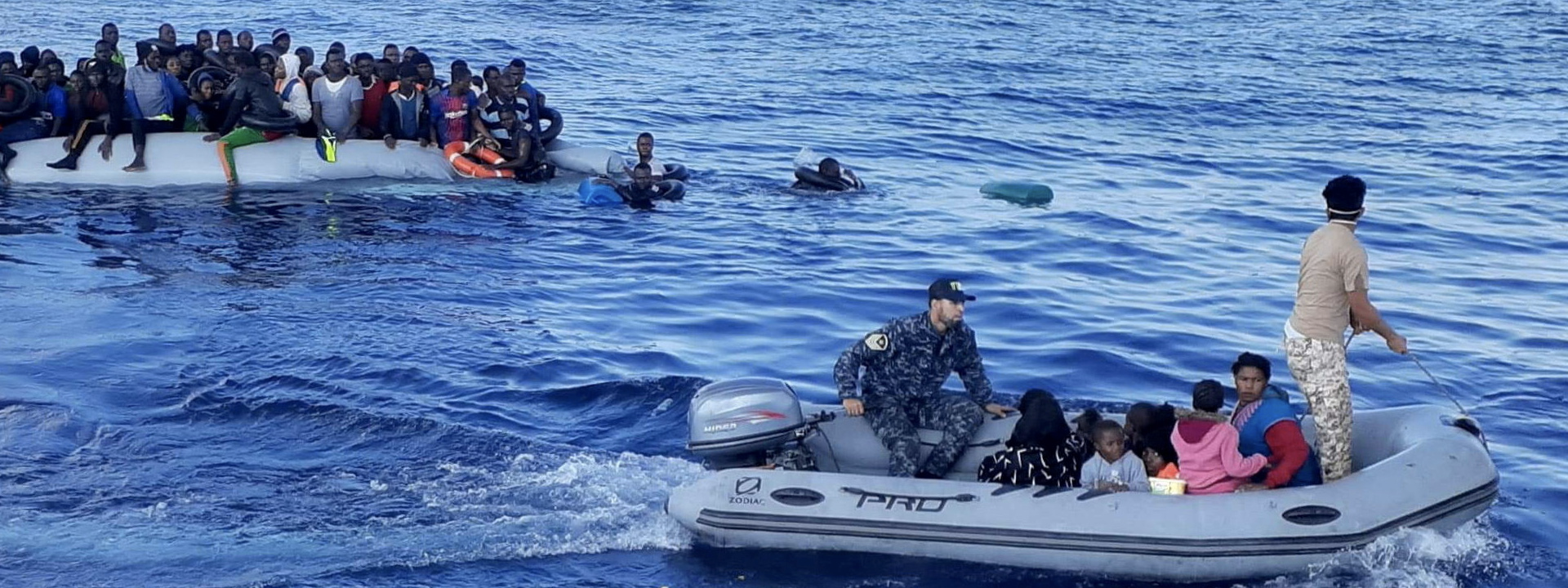
Amid increased immigration to Malta, Facebook pages amplify anti-immigrant backlash

Maltese Facebook pages with thousands of followers routinely attack non-government organizations focused on immigration issues in the Mediterranean and accuse them of human smuggling. These pages have organized counter-protests, created petitions, promoted anti-immigrant websites, and perpetuated hate speech against immigrants in Malta. These harmful narratives serve to disenfranchise life-saving NGOs operating on the coast of Malta and discourage resettlement of asylum seekers.
Malta is a historically popular immigration destination. The island’s membership in the E.U. and the Schengen Area has made it an attractive destination for African immigrants and European immigrants alike. Over the past decade, Malta has taken on a disproportionate percentage of refugees relative to other EU countries. As a result, the influx of immigrants to the tiny island has had a more visible and drastic effect: according to the Foreign Policy Research Institute, immigrants that have arrived in Malta since the turn of the 21st century represent over five percent of the country’s total population.

According to the UNHCR, more than 2,250 people that were rescued at sea from January to October 2020 disembarked in Malta. Most of the immigrants arriving by sea this year have come from Sudan, Eritrea, and Bangladesh.
Since 2018, Malta has seen a dramatic increase in arrival of immigrants by boat. However, in April of this year, Malta declared that it would no longer rescue immigrants at sea due to the COVID-19 pandemic. Since then, Amnesty International has accused the Maltese government of resorting to “dangerous and illegal measures for dealing with the arrivals of refugees and migrants at sea.”
Anti-immigrant pages
The pages the DFRLab examined — Malta Front, Defend MALTA, Malta tal-Maltin, Ir-Reati Kollha Tal-Barranin f’Malta, This is Malta, and We are Malta — varied in their audience size but are similar in terms of content. They attack pro-immigration NGOs and post accounts of alleged crimes committed by immigrants and refugees in Malta. While some had been active since the early years of increased immigration to Malta, three pages were created within the past two years.
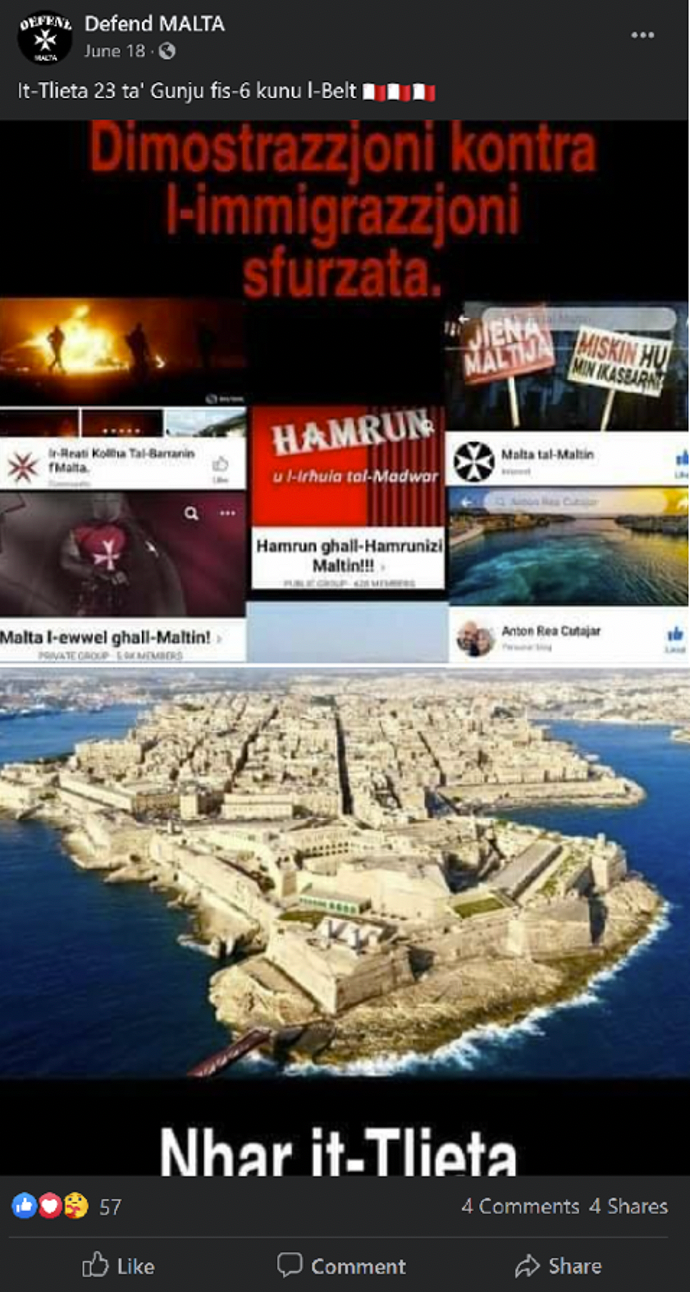
The most popular page, Defend MALTA, had accrued more than 21,000 followers since its creation in 2015. Prior to 2016, the page was named PEGIDA Malta, a reference to the anti-Islam political movement in Germany. The page appears to be aware of its precarious presence on Facebook, as it has also created a backup page in the event of a suspended or closed Facebook account.
In April, Defend MALTA launched an anti-immigration Change.org petition titled “Keep our ports closed.” The petition has received nearly 7,000 signatures at the time of publishing. Defend MALTA has also advertised several anti-immigrant protests, including a counter-protest against a June 8 anti-racist sit-in in Valetta, where counter-protesters were filmed making monkey noises and Nazi salutes. The prime minister of Malta condemned the counter-protest as hate speech. Defend MALTA posted about the protests in the days leading up to the June 8 counter-protest, urging followers to “join us next time,” while on the day of the protest encouraged them to “stick with the right group” and head to Valletta at 6pm. Malta’s Hate Crime and Speech Unit noted a dramatic increase in reported activity during the protests and counter-protests. From June 1–10, 2020, the unit received 78 reports of hate crimes and hate speech, more than five times as many reports for the entire month of May.
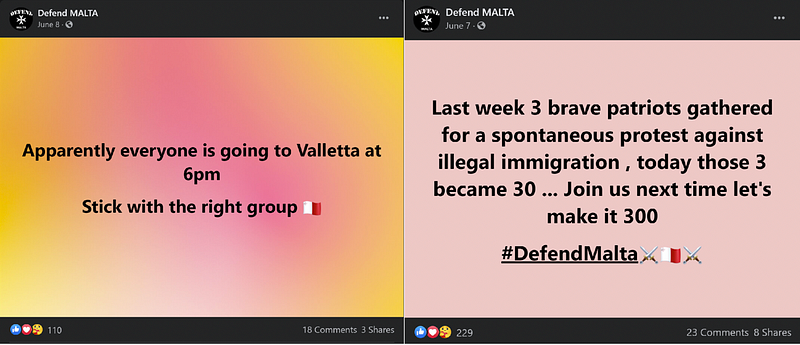

The anti-immigrant page This is Malta recently resumed posting after a two-year hiatus. This is Malta had over 20,000 followers and frequently reposted Defend MALTA. Meanwhile, another page, formerly known as Love between the Lines, changed its name to This is Malta in 2016. This second page had amassed over 17,000 followers and seemed to be an attempt to counter its original namesake’s anti-immigrant message. The newer This is Malta page states they “respect all countries religions and we don’t name people by colors. We love life and we love Malta, and this is Malta as supposed to be.”

The newest page, Malta Front, has an accompanying website created in June of 2020. The Malta Front website focuses on NGO activity and reporting crimes committed by immigrants. While the page has only about 7,000 followers, the website has received over 63,000 interactions on Facebook and is frequently shared by other pages.

The page Malta tal-Maltin, formerly known as Malta tal-Maltin -Lisa Seisun, has garnered attention by posting viral videos from anti-immigration commentator Lisa Seisun. In her short videos posted to Facebook, Seisun often opines about her proposals for anti-immigrant policies. Her video promoting a petition to stop all “illegal” immigration to Malta received over 51,000 views.
Attacking NGOs
The pages routinely lambast NGOs working on immigrant issues in the Mediterranean, particularly AlarmPhone, Republikka, and Sea-Watch. For example, Maltese civil society NGO Republikka recently came under fire from the anti-immigrant pages for filing a police report against the Maltese Army and the prime minister for the death of 52 immigrants at sea.
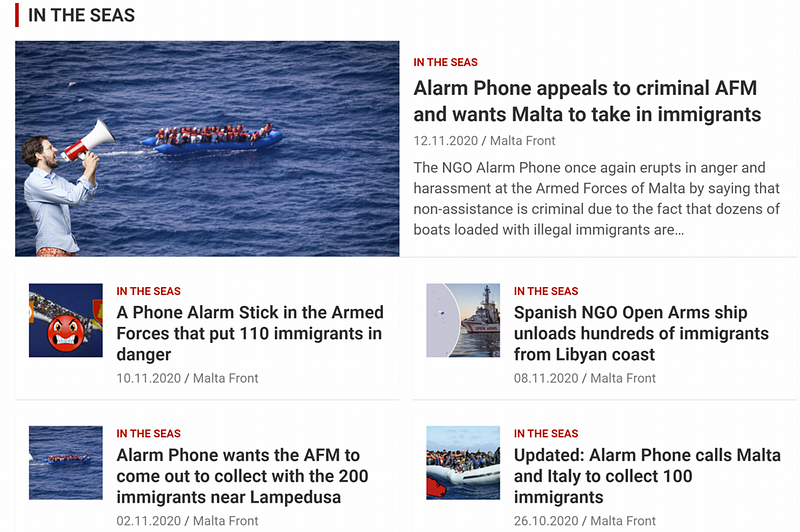
Sea-Watch, an emergency rescue NGO, is often referred to by these pages as a business with monetary interests tied to illegal immigration to Malta. The Malta Front website reports on the movements and activities of Sea-Watch, as well as the emergency hotline NGO Alarmphone. AlarmPhone has also attracted the ire of anti-immigrant pages for its criticism of the Maltese Coast Guard and the government of Malta.
Leading the charge against these NGOs is another Facebook page belonging to a controversial political figure, Neville Gafa. A former envoy to Libya and ex-staffer in the Office of the Prime Minister, Gafa has been accused of implementing illegal immigration deals between Libya and Malta, initiating deadly pushbacks, and demanding money from Libyan immigrants for medical visas. He is also an ardent opponent of NGOs and accuses them of breaking Maltese law. While he no longer has an official position in the administration, he has reportedly been involved in representing the current Maltese government in talks with the Libyan government. Anti-immigrant Facebook pages have come out in support of Gafa and often mirror his allegations against NGOs.
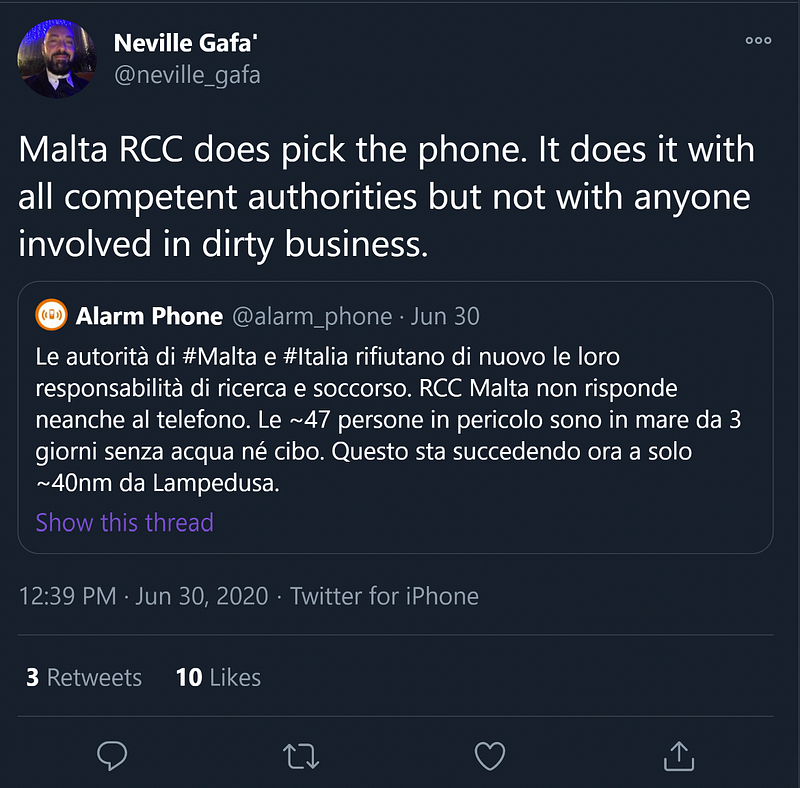
Gafa is facing legal charges for threatening an Italian journalist in a June 2020 tweet that was also in reply to NGOs AlarmPhone and Mediterranea. The tweet came after journalist Nello Scavo responded to Gafa’s comment on an Alarmphone tweet about a boat of refugees at sea. Gafa contends that his tweet, which said, “Stop your dirty business. If not, we will be stopping you,” was solely in response to AlarmPhone and not a threat against the journalist. Gafa frequently comments on AlarmPhone tweets in support of the Maltese coastguard and accuses various NGOs of conducting “dirty business.”
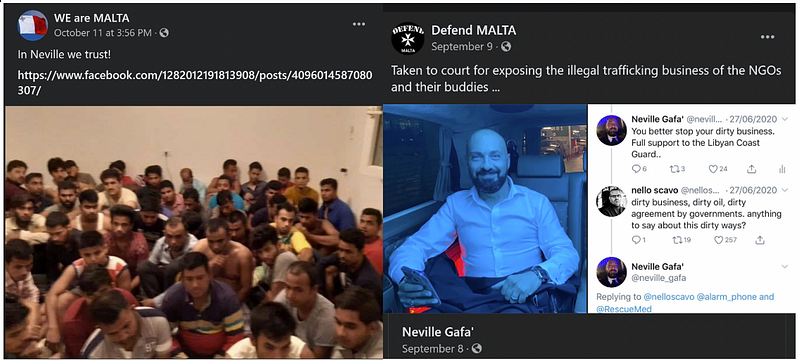
In August, Neville Gafa posted a photo of what he claimed was evidence of an NGO engaged in illegal human smuggling. The accusation was later debunked when Twitter account @bugdavem revealed that the photos were from three years prior.
So there are Neville Gafa’s “exclusives”.
I’m quite certain the public is better served if the press takes the time to fact-check rather than lazily & unquestioningly amplify apparatchik’s Facebook posts (that aren’t written by them).
— BugM (@bugdavem) August 25, 2020
As NGOs focused on immigration, asylum, and rescue operations put more pressure on the Maltese government through legal activity such as the investigation against Prime Minister Robert Abela, they have faced harsher pushback across the Mediterranean. On Facebook, several Maltese anti-immigrant pages have perpetuated the narrative that these NGOs are smuggling networks with ulterior motives, latching on to an ongoing court case in which 33 NGOs in Greece have been accused of facilitating the illegal entry of asylum seekers from Turkey into Greece.
The COVID-19 pandemic, meanwhile, is exacerbating conditions for refugees and amplifying backlash against them. Earlier this year in Greece, an anti-immigrant mob attacked journalists, civil society workers, and activists while attempting to push away an arriving boat of refugees.
Kayla Koontz is a Visiting Research Assistant with the DFRLab.
Follow along for more in-depth analysis from our #DigitalSherlocks.

